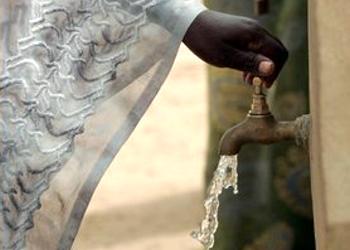聯合國大學和永續發展辦公室24日在聯合國紐約總部發表報告,警告水資源目標若未能達成,將威脅許多地區,導致政治系統動盪、影響全人類的財產和健康。
這份報告更指出,徹底解決水供應產業充斥的貪腐現象,是解決水資源衝突的關鍵。
缺水問題動搖國本 29億人面臨危機
「理想世界的水資源」(Water in the World We Want)報告以10個國家的個案研究為依據,指出全世界有29億人口將在10年內面臨水資源短缺的威脅,甚至動搖部分國家的國本。
研究者預測,全球48個國家──全世界國家的25%、總人口約29億──將於10年內正式被歸類為「水資源缺乏」(每年人均用水1,000至1,700立方公尺)或「水資源緊張」(少於1,000立方公尺)。
而且2030年時,全球水需求總量將超過總供應量40%,靠近赤道、資源較少而人口成長快速的國家問題特別嚴重。
水源供應遭中飽私囊
報告發表於今年9月全球後2015年發展目標(Sustainable Development Goal,SDG)到期前,深度分析10個各種發展階段國家,包括孟加拉、玻利維亞、加拿大、印尼、南韓、巴基斯坦、新加坡、烏干達、越南和贊比亞。
報告寫道,「在許多地方...貪腐導致珍貴的財務資源流失。」據估計,用於水資源和衛生相關改善措施的資金,有30%被中飽私囊。
「任何層級的貪腐不只是犯罪行為而已,從永續發展的觀點來看,更可說是侵犯了全人類的權益。」報告呼籲建立清楚的反貪腐協議,重罰嚴懲。
「未達水資源目標將造成廣泛的負面後果,導致更多國際緊張和衝突。缺少水資源的人們為了生存將不擇手段。改變基本的水文可能導致新型態的衝突,水資源缺乏和洪水將成為主要的跨國水議題。」報告主要作者Bob Sandford說。
Bob Sandford是水資源專家,聯合國生命之水十年計畫加拿大合作倡議的主席、西部流域合作研究總監和薩斯喀徹溫大學全球水資源研究所水文中心合作夥伴。
改善用水效率 聯合國籲能源轉型
「好消息是,只要我們繼續努力達成水資源永續發展目標,我們仍然可以享受美好未來。」Sandford說。
另一個達到水資源安全的關鍵因素,即是大型水資源相關投資。
農業每年耗費全球水資源70%,能源產業15%。報告建議,這兩個產業有責任改善效率,同時轉型成乾淨能源,包括水力發電。
Sandford和研究團隊建議,各國政府必須建立獨立專職的水資源機構,優先改善水資源、廢水和衛生管理的永續性。
研究人員計算出,全世界的水資源和廢水基礎建設的養護與汰換赤字正以每年2億美元的速度增加,光是美國就需要1兆美元的資金。
Cleaning up widespread corruption in the water supply industry is crucial to avert looming water conflicts born of desperation, warns a new United Nations report based on case studies in 10 countries.
“In many places … corruption is resulting in the hemorrhaging of precious financial resources,” siphoning an estimated 30 percent of funds earmarked for water and sanitation-related improvements, the report states.
The report, “Water in the World We Want,” warns that water supplies for 2.9 billion people in 48 countries will fall short of needs within 10 years, threatening “the stability and very existence” of some nations.
“Corruption at any level is not just a criminal act in its own right. In the context of sustainable development it could be viewed as a crime against all of humanity,” the report states, calling for clearly defined anti-corruption protocols enforced with harsh penalties.
Presenting their report at UN Headquarters in New York today, officials of UN University and the UN Office for Sustainable Development warned that unmet water goals threaten many regions and form a barrier to stable political systems, greater wealth and better health for all.
Published in advance of the adoption of global post-2015 Sustainable Development Goals, or SDGs, set for this September, the report provides an in-depth analysis of 10 countries at all development levels: Bangladesh, Bolivia, Canada, Indonesia, Republic of Korea, Pakistan, Singapore, Uganda, Vietnam, and Zambia.
“The consequence of unmet water goals will be widespread insecurity creating more international tension and conflict, said lead author Bob Sandford, who chairs the Canadian Partnership Initiative in support of the UN Water for Life Decade.
“People do not have the luxury of living without water and when faced with a life or death decision, people tend to do whatever they must to survive,” the report states. “Changes in fundamental hydrology are likely to cause new kinds of conflict, and it can be expected that both water scarcity and flooding will become major trans-boundary water issues.”
Within 10 years, researchers predict 48 countries – 25 percent of all nations on Earth with an expected combined population of 2.9 billion – will be classified “water-scarce” (1,000 to 1,700 cubic meters of water per capita per year) or “water-stressed” (1,000 cubic meters or less).
And by 2030, expect overall global demand for freshwater to exceed supply by 40 percent, with the most acute problems in warmer, low-resource nations with young, fast-growing populations, according to the report.
“The positive message is that if we can keep moving now on water-related Sustainable Development Goals we can still have the future we want,” said Sandford, a water expert, who serves as director of the Western Watersheds Research Collaborative and as an associate of the Centre for Hydrology in the University of Saskatchewan’s Global Water Institute.
National governments must make sustainable advancements in water, wastewater, and sanitation management, supported by a dedicated and independent arm’s length water agency, a high level policy priority, Sandford and his co-authors advise.
They calculate that the world’s water and wastewater infrastructure maintenance and replacement deficit is building at a rate of US$200 million per year, with $1 trillion now required in the United States alone.
As a result, another critical factor in achieving water security is the need for large new water-related investments.
The report recommends that the agriculture sector, which takes roughly 70 percent of world water supplies, and the energy sector, which takes 15 percent, be held accountable for greater efficiencies while transitioning to clean energy, including hydropower.
※ 全文及圖片詳見:ENS








